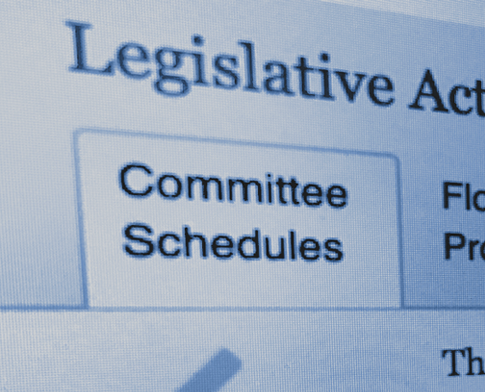Tax Update (April 8)
| House Ways and Means Tax Legislation
On Tuesday (Apr. 2), the House Ways and Means Committee passed two bipartisan bills: (1) a bill to reform the Internal Revenue Service (IRS) and (2) a retirement savings bill, both very similar to legislation previously passed by the committee in the 115th Congress. The first bill, H.R. 1957, entitled “The Taxpayer First Act of 2019,” aims to redesign the IRS for the first time in more than 20 years and better serve taxpayers. The second bill, H.R. 1994 entitled “Setting Every Community Up for Retirement Enhancement (SECURE) Act of 2019,” proposes expanding opportunities for Americans to increase their retirement savings and improves the portability of lifetime income options from one plan to another. It is unclear when the bills will be taken up by the full House, as Congress will recess for two weeks around Easter. The two bills would become the first bipartisan tax vehicles passed out of the House and sent to the Senate (H.R. 1 was adopted on a party-line vote; it includes language requiring presidential candidates to release 10 years of tax returns) and both are expected to receive a favorable vote in the Senate. To read more on Tuesday’s hearing regarding these two bills, click here. Grassley on Tax Extenders Package Senate leadership staff were asked this morning (Apr. 5) whether the bills could be the basis for the Senate to add the tax extenders legislation, which was introduced in Feb. by Finance Chairman Chuck Grassley (R-IA) and Ranking Member Ron Wyden (D-OR). That bill, the “Tax Extenders and Disaster Relief Act of 2019,” was sent to the Senate clerk under Rule 14, which would permit the bill to be taken up without first being acted upon by the Senate Finance Committee. It is uncertain if Senate leadership will attempt to add the tax extenders package to the SECURE and/or IRS bills to quickly move the extenders legislation to a House-Senate conference. While senators are hopeful that the House moves both its bills quickly, there is no interest in adding tax extenders to the House bills without an agreement from “the four corners” – the two tax chairs and ranking minority members. That agreement will be difficult to achieve, given House Ways and Means Democratic members desire to pay for the extenders package. Grassley addressed this in his opening statement on Friday: “Another important point I want to make has to do with the question of whether an extenders package should be offset or not. The House has its pay-as-you-go, or PAYGO, rule. I have a long record of promoting budget responsibility, and I am as concerned about the deficit and debt as much as anyone. However, we also have bipartisan precedent for treating the extension of temporary tax policy like we treat the extension of annual spending policy. In neither case do we offset such extensions.” Prior Senate leaders like former Majority Leader Harry Reid (D-NV) often used a parliamentary tactic to try to move tax legislation by taking a House-passed revenue bill, adding the provisions he wanted, and then “filling the amendment tree”, which blocked other senators from amending the bill. Senate rules generally permit any senator to offer any tax-related amendment they want to a tax bill on the Senate floor and Reid’s tactic prevented that from occurring. But leadership staff said Majority Leader Mitch McConnell (R-KY) will not do that in order to preserve comity both in the Republican conference and avoid exacerbating existing tensions with Democrats. Chairman Grassley also noted the House “paygo rule” is opposed by both sides in the Senate, so it appears that the only path to enactment for a tax extenders package will require bipartisan, bicameral agreement. SALT Working Group Committee Chairman Richard Neal (D-MA) said Tuesday (Apr. 2) that he asked Rep. Mike Thompson (D-CA), Chairman of the Subcommittee on Tax, to convene a working group on the tax law’s $10,000 cap on the state and local tax deduction. The $10,000 limit on state and local tax deductions isn’t likely to be changed, National Economic Council Director Larry Kudlow said, despite President Donald Trump’s earlier suggestion that he was open to discussing modifications. Trump’s Tax Returns House Democratic Ways and Means leaders sent a letter to IRS Commissioner Charles Rettig requesting six years of President Trump’s personal and business tax returns from 2013-2018, with a release deadline of Apr. 10. “The IRS has a policy of auditing the tax returns of all sitting presidents and vice-presidents, yet little is known about the effectiveness of this program,” Neal said in a statement.[1] The issue will require an analysis of the language of IRC section 6103, which provides that the IRS “shall” turn over tax returns requested by the tax committee chairs and/or Joint Committee on Taxation Chief of Staff. This Congressional Research Service (CRS) report is a useful review of the history of the statute and how it can be applied. EU Digital Tax A group comprised of 16 House Republicans penned a letter to President Trump concerning the French-proposed digital tax, stating it “targets US companies, US exports, and the US tax base.” To read the letter in its entirety, click here. [1] Jagoda, Naomi. “Dems Formally Ask for Trump’s Tax Returns.” The Hill. 3 Apr 2019. https://thehill.com/policy/finance/434567-dems-formally-ask-for-trumps-tax-returns |
HOUSE.GOV
The Week Ahead
For the main events of the next week and more, go straight to the key events on the house.gov website.
SENATE.GOV
The Week Ahead
For the main events of the next week and more, go straight to the key events on the senate.gov website.


